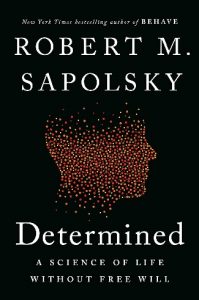Is every action predetermined or is there free will?
The notion of ‘free will’ is of Jewish-Christian origin, and is the other side of the coin which refers to that other nostrum – ‘(the problem of) evil’, which complicates things even more. God, being the summum bonum, is not responsible for evil; therefore that responsibility falls entirely on (fallen) man.
There is no notion in Plato (and generally among the ancient Greeks) of the concept of ‘free will’, in the sense of a faculty of the soul which determines a particular course of action – choice, in other words. Rather, it is an inclination or appetite (desire) which motivates action and is either for the highest and noblest aspiration in man, or for his lower preferences (they correspond to Being and Becoming respectively). When the inclination is towards the Good, Plato calls it Eros. This account of ‘good will’ was preserved in St. Augustine (dilectio or caritas).
A similar view can be found in Br.Upanishad 4.4.5: “Man is fashioned by desire; according to his desire is his discernment; according to his discernment he does his work.” Also: “For just as men here below pursue the aim after which each aspires, as it were done at command, whether it be a kingdom, or an estate, and live only for that, (so in their aspiration for heavenly rewards they are the slaves of their desires” – Chand.Upanishad 8.1.5). Paul Deussen, in ‘The Philosophy of the Upanishads’, from which I just quoted, concludes: “The standpoint of the Upanishads, therefore, is a rigid determinism”.
That judgment, however, should be applied only to the empirical viewpoint of the everyday world, not to the higher one, where Atma (-Brahman), the only reality, reigns with absolute freedom, if one can say that. ‘That Thou art’.
http://www.scienceandnonduality.com/the-paradox-of-free-will/
 S&T is a creature of S and T!
S&T is a creature of S and T! 

